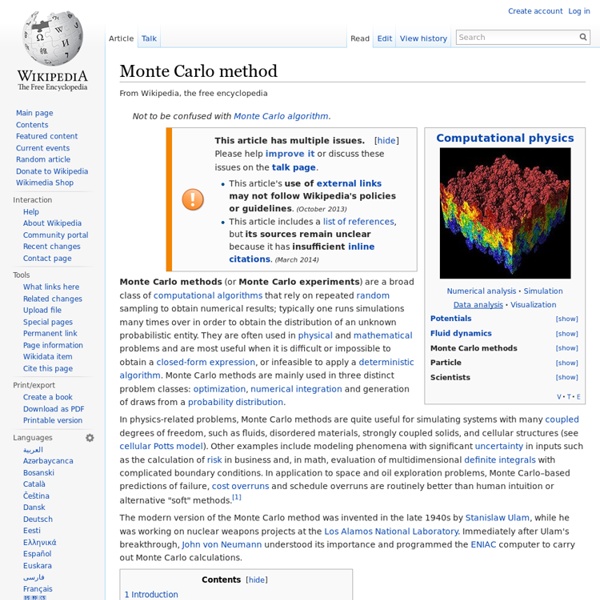BBC Four - Climate Change by Numbers
Latin Hypercube Sampling | Mathieu Fenniak
Introduction Latin hypercube sampling (LHS) is a form of stratified sampling that can be applied to multiple variables. The method commonly used to reduce the number or runs necessary for a Monte Carlo simulation to achieve a reasonably accurate random distribution. LHS can be incorporated into an existing Monte Carlo model fairly easily, and work with variables following any analytical probability distribution. Monte-Carlo simulations provide statistical answers to problems by performing many calculations with randomized variables, and analyzing the trends in the output data. The concept behind LHS is not overly complex. The sampling algorithm ensures that the distribution function is sampled evenly, but still with the same probability trend. Figure 1. Figure 2. Process Sampling To perform the stratified sampling, the cumulative probability (100%) is divided into segments, one for each iteration of the Monte Carlo simulation. Grouping Example Sampling: Conclusion
Dr Hannah Fry: the mathematical models that underpin our sexual success | Science
What are the odds? Or how mathematician Peter Backus weighed up his chances of finding love… Just as it’s not possible to calculate precisely how many alien life forms there are, it’s also not possible to calculate exactly how many potential partners you may have. It also applies to maths student Peter Backus’s well-publicised quest to see whether there were intelligent, socially advanced women of the same species out there for him to date. 1. 2. 3. 4. 5. 6. 7. Leaving him with just 26 women in the whole world he would be willing to date. Personally, I think that he is being a little picky. I think there’s room to be a bit more generous. 1. 5. 6. 7. Almost a thousand potential partners across a city, then. But there is another issue. Strangely though, opening our minds to all potential partners seems to be the opposite of what we do when we’re single. The statistics of sex In 1996 Swedish scientists asked 2,810 people how many sexual partners they’d had. The happily ever after
Design of Experiments :: Overview :: The Quality Portal
The order of tasks to using this tool starts with identifying the input variables and the response (output) that is to be measured. For each input variable, a number of levels are defined that represent the range for which the effect of that variable is desired to be known. An experimental plan is produced which tells the experimenter where to set each test parameter for each run of the test. DOE is team oriented and a variety backgrounds (e.g. design, manufacturing, statistics etc.) should be involved when identifying factors and levels and developing the matrix as this is the most skilled part. In order to draw the maximum amount of information a full matrix is needed which contains all possible combinations of factors and levels.
Ding Dong Bell
The sound of bells In East Anglia, as you look across the fens, villages appear almost like little islands (indeed some of them were islands before the fens were drained) and these villages are dominated by big churches with tall towers. In the past people regulated their lives and passed messages by ringing church bells, which could be heard for miles around, telling the time of day, and giving news of births, marriages and deaths in a parish. The following quotation comes from the ringer's rules from Southhill in Bedfordshire "When mirth and pleasure is on the wing we ring; at the departure of a soul we toll". Bell ringing is good exercise for the body and mind, the bells are heavy and the bellringers have to remember the changes. The mathematics of the changes With four bells there are of course many more possibilities; there are twenty four different permutations or orders in which the bells can be rung and there are four bell ringing changes. Find the vertex labelled 1234.
Tikhonov regularization
When the following problem is not well posed (either because of non-existence or non-uniqueness of where may be ill-conditioned or singular). In the latter case this is no better than the original problem. In order to give preference to a particular solution with desirable properties, the regularization term is included in this minimization: for some suitably chosen Tikhonov matrix, . , is given by: The effect of regularization may be varied via the scale of matrix . this reduces to the unregularized least squares solution provided that (ATA)−1 exists. History[edit] Tikhonov regularization has been invented independently in many different contexts. Generalized Tikhonov regularization[edit] For general multivariate normal distributions for and the data error, one can apply a transformation of the variables to reduce to the case above. to minimize where we have used to stand for the weighted norm (compare with the Mahalanobis distance). is the inverse covariance matrix of is the expected value of , and
learn morse code
Lean Manufacturing Glossary & Definitions
5S: 5S is a housekeeping methodology for the shop floor. There are five rules of housekeeping for a lean environment and they help to expose waste and support the discipline needed to implement the Toyota Production System. The five S’s are described below: 1. 2. 3. 4. 5. If a company does not have the discipline to execute the five S’s, it will not have the discipline to complete standard work, pull systems, and other lean techniques. 5S is the very first step on a company’s learn journey. Andon: Simply means “light” in Japanese. Andon Board: A visual control device in a work area, typically a lighted overhead display giving the current status (green, yellow, red) of each step in the production system and alerting team leaders and supervisors to existing or emerging production problems. Automation: Employing machines to do the work of people. Automatic Time: The time when a machine is running on an automatic cycle and a person is not needed to operate the equipment. Return to top



